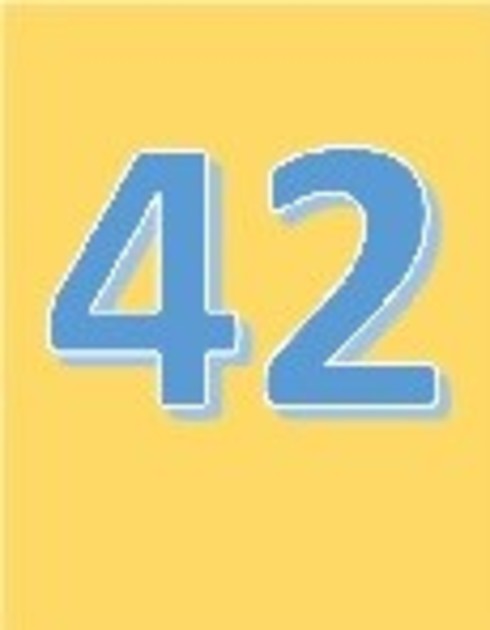
42 – Parshat Matot-Masei
No, this is not a blog on "The Hitchhiker's Guide to the Galaxy".1 Imagine - there are other times that the number 42 appears. For instance, the only uniform number that is permanently retired in Major League Baseball is the number 42, the number that Jackie Robinson wore. It is also the atomic number of the element Molybdenum.
Even so, with a tip of the hat to all Douglas Adams fans, I would like to touch on the number 42 which appears in this week's double parsha.
We read in Parshat Masei of the 42 stops that the Jewish people made on their path from Egypt to Israel.2 Yet if we look at the names of the 42 stops, there are many that we don’t recognize. Chazal tried to locate them by looking for hints or subtleties in the name but did not succeed with all 42. We are left then, with some names in the Torah that we don’t recognize and don’t understand why they are even mentioned. An explanation is offered by Rabbi Aharon Sabba, the author of Tzror Hamor. (Rabbi Sabba lived through the Spanish Inquisition and eventually the expulsions from Spain in 1492 and from Portugal in 1496.) According to Kabbalah, he writes, one of God's names consists of 42 letters. Though we know how to spell it, we do not understand this name or its meanings. So too, the Torah, in counting each of the 42 stops - even those we don't recognize - hints that just like with God's name, we are not meant to understand all that transpired. That, too, is part of the secret of God's name. Just as we don’t understand all of God's names, he adds, so too we do not always understand all those places we have been to in our lives. Please remember that he writes this in the wake of his experiences at the end of 15th century. We simply cannot understand all of the travails we experience.
Some realities are very difficult. Does someone truly understand a child suffering with terminal leukemia? Or people who were careful about social distancing and yet still suffer from coronavirus? We feel the pain and suffering of these people. We also do not wish to allow that pain to prevent us from continuing to grow. How do we accomplish that? What kind of attitude will help us through those challenges?
If we use Rabbi Sabba's teaching, we may conclude that we are to surrender to our fate. But 'surrender' does not mean a depressing, final defeat. Surrender here is rather to submit to a reality that is present. Fighting against that reality, if it is an unalterable reality, will be like trying to move a mountain with your bare hands. It is futile. Rather he is talking about acceptance of that reality even if we do not understand it.
Echoing the concepts of logotherapy,3 Eckhart Tolle writes: “Always say “yes” to the present moment. What could be more futile, more insane, than to create inner resistance to what already is? What could be more insane than to oppose life itself, which is now and always now? Surrender to what is. Say “yes” to life — and see how life suddenly starts working for you rather than against you."4
Again the word 'surrender' is used not to encourage a sense of defeat but rather an acceptance of reality. It is legitimate to mourn. Pain, physical and emotional, can be very real. We speak then not about denial of the pain but rather on how to develop an attitude so that we can move forth despite the pain, get life suddenly to start working for you despite the pain, and say "yes" to life.5
Notes
- Adams, Douglas. Hitchhiker's Guide to the Galaxy
- Bamidbar chapter 33
- Frankl, Viktor E.. The Doctor and the Soul (p. 43). Knopf Doubleday Publishing Group. Kindle Edition.
- Tolle, Eckhart. The Book of Now, p. 35 New World Library. Kindle Edition.
- 'Yes to Life' is also the title of a book by Doctor Viktor Frankl. It was recently released and includes a series of lectures given shortly after he was liberated from Auschwitz.
Acknowledgments
My thanks to Rabbi Michael Taubes for talking about the ideas from the sefer Tzror Hamor. They were taught in a short class he gave and can be found at this url: https://www.yutorah.org/sidebar/lecture.cfm/963718/rabbi-michael-taubes/parsha-practice-and-p-shat-mattos-masei/
Have A Great Shabbat!![]()
For More Information On Logotherapy And How You Can Create A Fuller, More Meaningful Life, Or To Book An Online Session,
- Call Me At +972-54-589-3399, or in Israel 054-5893399
- Contact Me Thru my email at [email protected]

 Previous
Previous

